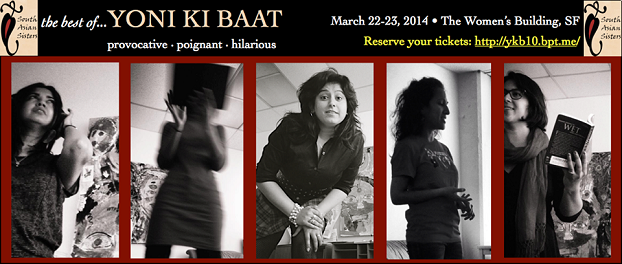
This year marks the tenth anniversary of Yoni Ki Baat, a collection of provocative and witty stories performed on stage and inspired by Eve Ensler’s The Vagina Monologues.
Written and performed by South Asian women, Yoni Ki Baat explores the shared experiences of a woman’s yoni (the Hindi word for vagina) through the arts.
The performance is organized by the San Francisco-based organization South Asian Sisters, a group of activists and feminists dedicated to providing a platform for expression and discourse. The performance explores topics such as body image, sex, rape, gender identity, menstruation, masturbation, and other shunned topics affecting women from the South Asian diaspora.
Vandana Makker from South Asian Sisters spoke with The Aerogram to discuss what the 10-year anniversary means for the South Asian community and how the organization was able to use inspiration from The Vagina Monologues to mirror the experiences of South Asian women.
Q: Yoni Ki Baat has been heavily influenced by The Vagina Monologues. How did South Asian Sisters come up with the idea, and how is the performance different from or similar to The Vagina Monologues?
VM: Maulie Dass started South Asian Sisters in 2001 as a website with a list of resources for South Asian women in the U.S. By 2003, a few more of us had started meeting up and wanted to make it a more formal organization here in the Bay Area — one that [pullquote align=”right”]“We should do The Vagina Monologues but make a desi version.”[/pullquote]would allow Desi women the space to meet and create and discuss issues that were important to us. Three of us — Maulie, Sapna Shahani, and I — were trying to think of a splashy way to introduce ourselves to the Bay Area progressive community. And then, one day over dosas in Berkeley, Sapna just said, “We should do The Vagina Monologues but make a desi version.” And that was that.
At first we were a bit daunted by the potential costs of using Eve Ensler’s concept (we had exactly zero dollars), but then, fortuitously, the Kimaaya Theater Company in Bangalore had just put on the first production of TVM in India. They put us in touch with Eve directly, and she gave us her blessings and has been fully supportive of our project for all these years. One big difference between YKB and TVM is that TVM has one script that IS the show. Our scripts change from year to year, as we generally put out a new call for submissions each time.
Q: For those who don’t know about Yoni Ki Baat, what is it? And how does Yoni Ki Baat highlight the different slices and experiences of South Asian women through often times scintillating and unconventional skits?
VM: Yoni Ki Baat allows individuals who identify as women of South Asian ancestry the space to share their stories around issues that are often “taboo” (and therefore not discussed) in our communities. Stories around sex, body image, abuse, violence, [pullquote align=”right”]Stories around sex, body image, abuse, violence, pleasure, hair, relationships, bodily functions, strong emotions[/pullquote]pleasure, hair, relationships, bodily functions, strong emotions — those things we often can’t even admit to ourselves. These are the stories that we seek out and then perform on stage. Sometimes the writers perform their own pieces and sometimes we have other women perform them. In the spirit of The Vagina Monologues, a portion of the proceeds from each show are donated to organizations that support survivors of domestic violence.
Because the experiences shared are real, they end up being very eclectic, yet relatable at the same time. While you may not have had the exact same “hair removal snafu” as the woman on stage, you have undoubtedly had something similar happen, or know someone who has. Perhaps you have been lucky enough to never have been through an abusive relationship, but you can empathize with the trauma that the storyteller is sharing. The stories connect us while at the same time highlighting the fact that not all desi women are “the same.”
Q: National Slavery and Human Trafficking Month was recently observed in the month of January. Several grassroots organizations and local leaders took to the streets to protest and spread awareness about modern forms of slavery and sex trafficking. In Yorba Linda, Calif., a 17-year-old human trafficking victim was recently stabbed to death. It seems as though human trafficking is still very much present and alive in our backyards. What can South Asians and other communities do to help raise awareness about sex trafficking and other types of injustices?
VM: Maybe it’s just my perspective, but I think people really are more politically active now. It’s not a fringe element. Even within the mainstream South Asian community, people are taking a much more active and civic responsibility. It’s not just some people [pullquote align=”right”]If it’s an injustice being done, the action needs to be taken.[/pullquote]working on it; that being said, anything that has to do with sex or a women’s issue, I feel like it is still in a lot of ways, taboo to discuss in certain parts of our community. I think just the less you talk about it — doesn’t mean it’s not happening; it actually makes it worse. I think just not being afraid to discuss issues like this within our families and communities and really speaking out no matter what the topic is. If it’s an injustice being done, the action needs to be taken. We are more politically active and aware, but some issues are not spoken of.
Q: Over the past few years, the South Asian community has launched organizations (SAHARA, Maitri, Sawera, Narika, etc) to address domestic violence and provide a space for healing and support for survivors. Have we seen progress in the South Asian community in the past few years in terms of transparency?













1 thought on “‘Yoni Ki Baat’: A ‘Vagina Monologues’-Inspired Celebration of South Asian Women”
Comments are closed.